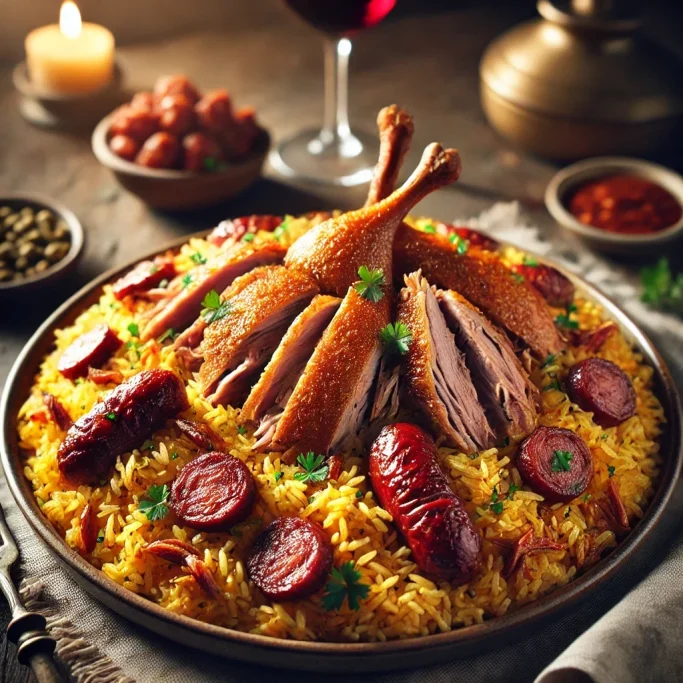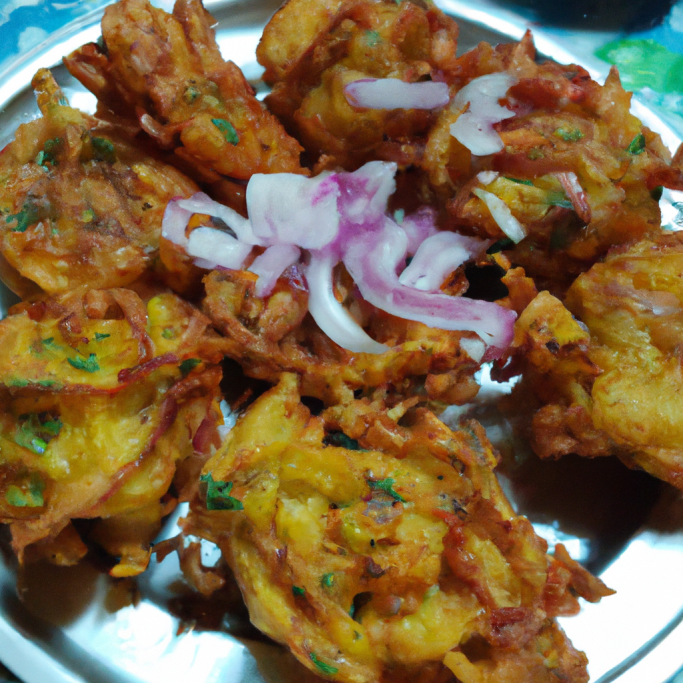Duck, Duck… Rice: A love affair with arroz de pato in Portugal
I’ve eaten my way through a lot of countries. Some dishes I remember because they blew my mind, some because they damn near killed me, and others just because they were there, in the right place at the right time. But then there are the meals that get under your skin, stay with you long after you’ve paid the bill and walked away. Meals that don’t need to scream for attention or come with a Michelin-starred pedigree to knock you on your ass. Meals like Arroz de Pato in Portugal.
It was one of those sticky, golden afternoons in Porto when the light makes everything look like it’s dipped in honey. The city was sweating out the last of summer, the Douro River rolling lazily by, and I was wandering, aimless, jet-lagged, and hungry in that gnawing way that gets louder the more you try to ignore it. I hadn’t come to Porto with a plan. No list of must-visit restaurants, no recommendations. I wanted to feel the place—really feel it—and let it show me where to go.
And that’s how I ended up in a narrow alley somewhere near the Ribeira district, following my nose into a small, unremarkable taverna, the kind of place that feels like it’s been around since Vasco da Gama was still sailing. No fancy signage, no tourists snapping photos for Instagram, just a few locals hunched over plates, heads down, speaking in that rapid-fire Portuguese that’s as much music as it is language.
I knew what I was here for the moment I sat down. Arroz de Pato. Duck rice. I’d read about it somewhere—maybe in one of those travel guides you toss into your bag at the last minute and never look at again. But it had stuck with me. Duck, slow-cooked and shredded, mixed into rice, crispy on top with slices of chouriço. Simple. Honest. The kind of dish that sounds almost too straightforward, like it doesn’t want you to know just how good it really is until you taste it.
The waiter—a man who looked like he’d spent his life in this place, wearing a permanent expression of mild disinterest—didn’t say much. Just a nod, and within minutes, the dish was in front of me.
At first glance, it was underwhelming. A brownish mound of rice with chunks of dark duck meat hiding beneath a layer of crispy, roasted skin. The chouriço—Portugal’s gift to the world of sausages—was dotted around like bright red punctuation marks. No pretensions, no flourishes. Just food.
But the smell… that’s where it started to pull me in. There’s something about slow-cooked duck that wraps itself around your senses like a blanket. It’s heavy, earthy, with that rich, fatty aroma that tells you time and patience have gone into this. And beneath it, the familiar scent of garlic, mingling with the smokiness of the chouriço. I could feel my stomach rumbling, impatient.
I took a bite.
And here’s the thing about Arroz de Pato: it’s not trying to be a revelation. It doesn’t need to be. It’s comfort food, pure and simple, but comfort food with depth. The duck was tender, almost melting into the rice, which somehow managed to be both light and crispy at the same time. The top layer had been roasted to that perfect golden-brown crunch, while the rice underneath soaked up all the juices from the meat, rich with fat, garlic, and that smoky, slightly spicy oil from the chouriço. It was the kind of dish that makes you slow down without even realizing it, savoring each bite because it’s not just about flavor—it’s about texture, warmth, and memory.
This was a dish made by someone who understood restraint. No unnecessary frills, no excessive seasoning, just a balance of flavors that spoke for themselves. It was as if the duck and the rice had been in conversation for hours before I arrived, quietly trading secrets until they reached some kind of understanding. And now, all I had to do was listen.
The restaurant itself was hushed, the afternoon light filtering through the windows, casting long shadows across the wooden tables. I could hear the faint clinking of silverware, the low murmur of Portuguese from the table next to me, but it all seemed distant, like I was wrapped up in this moment with my plate and my glass of local red wine, the kind that stains your teeth and leaves you a little more flushed than you’d like to admit.
By the time I finished, I wasn’t just full—I was satisfied in a way that goes beyond hunger. I felt like I had been let in on something, a secret that had been passed down through generations, from mother to daughter, from cook to cook, always just below the surface of this quiet little country.
As I paid the bill—ridiculously cheap for what I’d just experienced—the old man behind the counter gave me a look. It wasn’t much, just a slight smile and a nod, but in that moment, I felt like we understood each other. No need for words.
Stepping back outside, the heat of the day hit me again, but I didn’t mind. I wandered down towards the river, the scent of duck and garlic still lingering in my memory, mingling with the sound of the city as it carried on, oblivious to the little revelation I’d just had.
Arroz de Pato. It’s not just a meal. It’s an invitation to slow down, to pay attention, to appreciate the simple things done right. It’s the kind of dish that reminds you why food matters—not just as sustenance, but as history, as culture, as connection. And like all the best meals, it leaves you wanting just one more bite.


Portuguese-style arroz de Pato (duck rice)
Ingredients
For the stock:
- 1 whole duck quartered
- 100 g bacon cut in chunks
- 150 g Portuguese (or Spanish chorizo
- 1 carrot
- 4 cloves of garlic crushed with a knife
- 2 bay leaves a sprig of rosemary, 3 sprigs of thyme
- 1 small onion quartered
- 1/2 port or red wine
- 4-5 cups of water
For the dish:
- 1 small onion chopped
- duck meat chourico, bacon and duck stock from above
- 2 tbsp reserved duck fat
- 4 cloves garlic
- 1.5 cups long grain rice Carolino, basmati
- Fresh parsley or coriander chopped
Instructions
For the stock:
- Place a large stock pot over high heat. Once hot, place the duck pieces with the fat facing down, fry on both sides until golden brown. Drain the fat into a bowl and keep it. Reduce the heat to medium.
- Add in 1 onion cut in quarters (keep the skin on for more stock colour), the carrot, the whole crushed garlic cloves, the bay leaves, and the rosemary and thyme sprigs. Cook for a minute or two. Deglaze with the port or red wine.
- Add HALF the chouriço and all the bacon to the stock pot, cover with the water. Season it with salt and black pepper, and let it simmer for 40 minutes.
- Remove the duck pieces, the bay leaf and herbs, the bacon and the chouriço from the broth, set aside to cool. Remove the meat from the duck legs.
- Add the bones and skin back into the pot and return to the heat and continue to simmer another 20 minutes or so.
- As the stock continues to cook, shred up the rest of the duck and set it all aside, discarding any skin or fat. Finely chop the bacon and chourico that was in the pot and set aside.
- Once the stock has cooked a little longer, remove from heat and let cool slightly then remove as much fat from the top as you can, then strain the stock. Discard the bones and bits. If you have the time, you can store the stock in the fridge to harden the fat, making it easier to remove.
For the rest of the dish:
- Pre heat the oven to 375F/190 °C.
- Place a medium pan (preferably with a thick bottom) over medium heat, add in a couple of spoons of the rendered duck fat reserved at the beginning. Dice the remaining onion and fry it until translucent. Add the garlic, and chopped bacon and chourico from earlier. Add in the rice, fry it for about 2 minutes, coating it in the duck fat. Season with salt and pepper
- Add three cups (720ml) of the duck stock to the pot with the rice, cover and bring to a simmer. Cook for about 25 minutes or until the rice is just cooked and the liquid is largely absorbed.
- Remove the pot from the heat and mix in the shredded duck meat. Pour everything into a baking dish then place slices of the other half of the chourico (that you didn’t make the stock from) spaced out over the top.
- Bake in oven for 25-30 minutes until the top of the rice is gently crisped and chourico is starting to crisp up as well.
- To serve, sprinkle with chopped fresh parsley or coriander.
- Serve with a lovely glass of Portuguese red wine. ENJOY!






